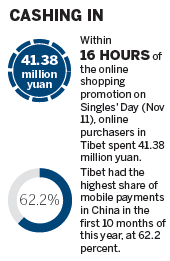Friday afternoon was a busy time for 28-year-old Tang Xianlin, a deliveryman in Lhasa, capital of the Tibet autonomous region.
 |
|
A courier verifies an address with a client in Lhasa, Tibet autonomous region. Online shopping has gained rapid popularity in the region. [Palden Nyima/China Daily] |

He had more than 200 parcels to deliver during the day, but his cellphone battery twice ran short of power for him to call recipients.
Following China's biggest online shopping promotion on Nov 11, or 11/11, which marked Singles' Day, a new sales bonanza began on e-commerce platforms on Friday, 12/12, with many shops starting their promotions one or two days earlier.
Tang said the number of items requiring delivery each day has increased significantly from last year.
As it takes a relatively long time for products to become available in Tibet, e-commerce, and online shopping in particular, has boomed in the region in recent years, playing an increasingly important role in daily life.
"Most items we deliver are from online shopping, such as clothing, shoes and electronic products," Tang said.
"Thanks to improved public transportation, the logistics industry is growing fast in Tibet as a result of the dramatic increase in e-commerce."
Tibet has overtaken coastal cities and is rapidly becoming China's leading area for mobile shopping.
Within 16 hours on Singles' Day, purchasers in Tibet had spent 41.38 million yuan ($6.67 million) on Taobao, the nation's biggest online shopping platform.
According to a 2014 consumer spending report by Alipay, the payment arm of e-commerce giant Alibaba Group Holding, Tibet had the highest share of mobile payments in the first 10 months of the year, at 62.2 percent.
Tang said he wants to open an express delivery company in Tibet. "I found that more people are traveling and working in Lhasa. I think the demand for deliveries in Tibet is growing and it's a great business opportunity."
Drokhang, a 36-year-old Tibetan, is looking to the potential of e-commerce to introduce high quality Tibetan products to outsiders. He is negotiating with Alibaba to open a large online shop this month.
The products he plans to sell include Tibetan handicrafts, food, medicine, medicinal herbs, ornaments and ethnic clothing.
Tenzin Lhamo, 27, who works in the public sector and started online shopping three years ago, said, "Convenience and more options are the biggest attractions for purchasers." She said she has spent 20,000 yuan on online purchases.
"Payment safety is well guaranteed, and it's much cheaper. It also saves more time, which is crucial for women like me. I have a baby and still need to work."
The size of China's online shopping market in 2013 was 1.8 trillion yuan, according to a report by hybris AG, a division of software giant SAP AG, which is based in Germany.
The size of the mobile shopping market is expected to reach 1 trillion yuan ($162 billion) by the end of 2017. The most popular payment method in Tibet is e-banking.
According to the local statistics department, clothing, cosmetics, shoes and hats are the most popular items for Tibetan online customers.
Statistics from the China Internet Network Center show that Tibet had more than 2 million Internet users by the end of last year.
Yang Wanli contributed to this story.
Related Stories